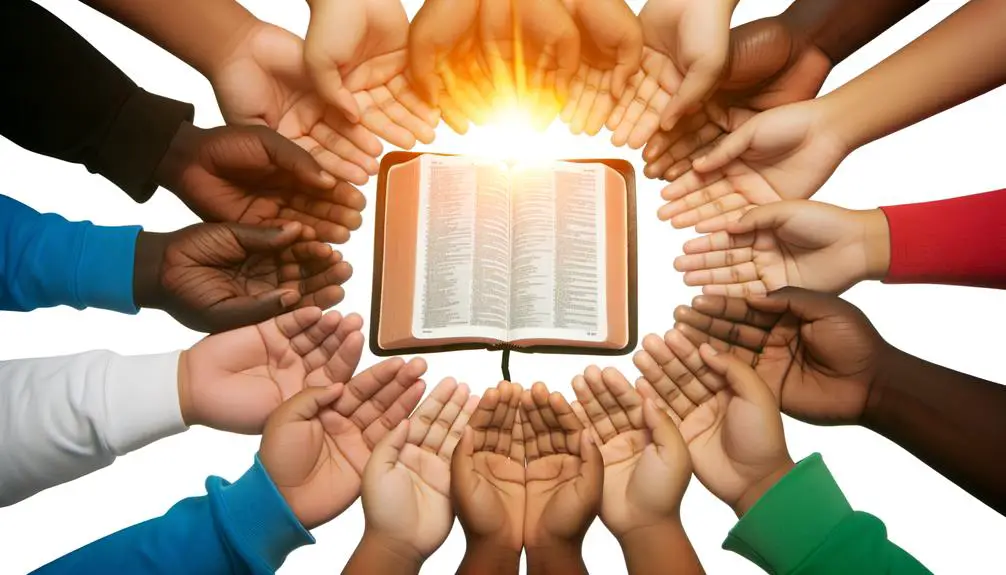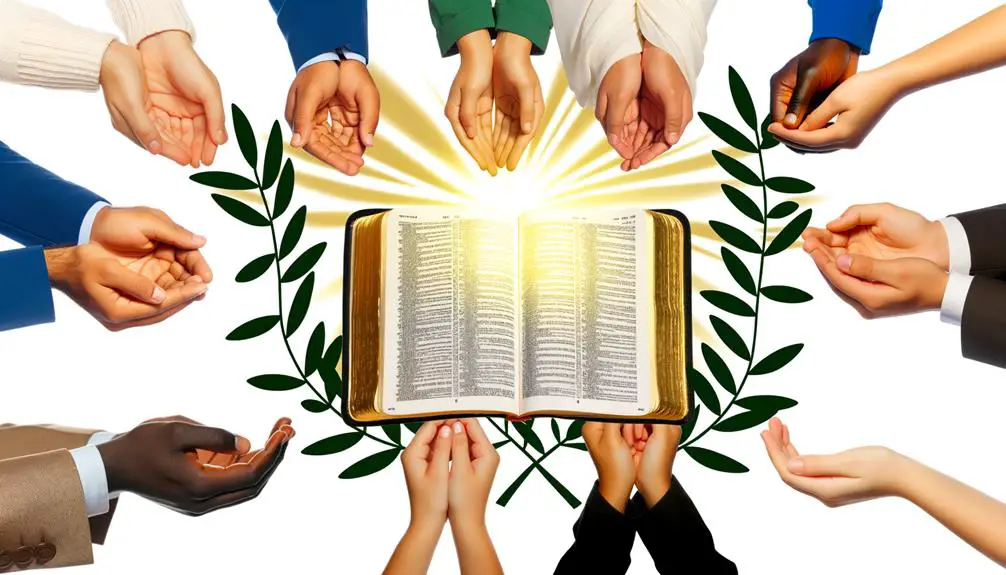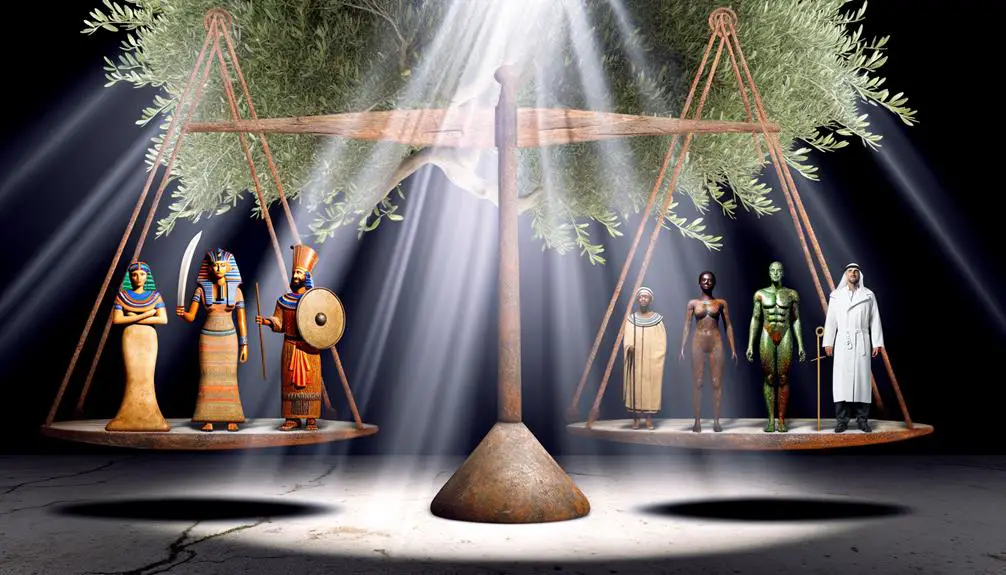Mysterious and multifaceted, race verses in the Bible offer a rich tapestry of interpretations, inviting a deeper exploration of spirituality and history.

Race Verses in the Bible
Imagine walking through a vast, ancient library, each book filled with wisdom and narratives from times long past. Among these, the Bible stands out, a tome rich in history, guidance, and complex discussions on race.
You've likely encountered key verses that touch upon race, yet the context and interpretation of these passages can be as diverse as humanity itself. As you explore the historical impact and modern perspectives on biblical race verses, you'll find that understanding their true meaning is not just about translating words, but about bridging cultures and centuries.
This journey offers insights that are both challenging and enlightening, beckoning you to explore deeper.
Key Takeaways
- The Bible promotes racial unity and equality, as seen in Galatians 3:28 and Acts 17:26.
- Historical misinterpretations of biblical texts have justified racial discrimination and hierarchy.
- Modern biblical scholarship seeks to reevaluate texts to emphasize diversity and ethnic reconciliation.
- Understanding the historical and cultural context of biblical verses is crucial for accurate interpretation related to race.
Understanding Biblical Context

To fully grasp the discussions on race in the Bible, it's crucial to understand the historical and cultural context within which these texts were written. The Bible, composed over centuries, reflects the diverse cultures, languages, and societies of its authors. Cultural influences profoundly shaped the narratives, laws, and teachings, including those related to race and ethnicity. It's essential to recognize that the concept of race, as understood today, didn't exist in the same form in ancient times. Thus, interpreting these texts requires a nuanced appreciation of the cultural lenses through which the authors viewed diversity and identity.
Translation challenges further complicate understanding of race in the Bible. The original texts, written in Hebrew, Aramaic, and Greek, have undergone numerous translations into various languages over millennia. Each translation is an interpretive act, influenced by the translator's cultural background, understanding of the source text, and the contemporary issues of their time. This process can obscure or distort the original meanings of passages related to race, leading to interpretations that may not accurately reflect the intent of the original authors.
Moreover, it's important to approach these texts with a critical eye, aware that historical and cultural distance can lead to misunderstandings. Scholars often emphasize the importance of contextual analysis to uncover the underlying messages related to race and ethnicity in the Bible. By acknowledging these layers of cultural influences and translation challenges, you'll gain a deeper, more accurate understanding of the biblical discussions on race.
Key Verses on Race

Several verses in the Bible address issues of race and ethnicity, offering insights into how these concepts were understood and negotiated in ancient times. The scriptures reflect a complex understanding of human diversity, underpinned by a foundational belief in the unity and equality of all people before God. This perspective is crucial for grasping the biblical worldview on racial unity and the notion of divine creation that posits every human being as made in the image of God.
When examining key verses, three stand out for their direct relevance to the discussion of race:
- Galatians 3:28: 'There is neither Jew nor Greek, slave nor free, male nor female, for you're all one in Christ Jesus.' This verse is pivotal for its explicit declaration of equality and unity among believers, transcending racial and ethnic divisions.
- Acts 17:26: 'From one man he made all the nations, that they should inhabit the whole earth.' This verse speaks to the divine creation of humanity, emphasizing a shared origin that undercuts assertions of racial superiority.
- Revelation 7:9: 'After this I looked, and there before me was a great multitude that no one could count, from every nation, tribe, people and language, standing before the throne and before the Lamb.' This vision of heavenly worship underscores the diversity of God's kingdom, celebrating racial and ethnic differences within the unity of faith.
These verses collectively affirm the Bible's message of racial unity and divine creation, challenging believers to recognize and celebrate the intrinsic value of all individuals, irrespective of their racial or ethnic identities.
Interpreting Race in Scripture

Understanding the verses that speak to race in the Bible requires a nuanced interpretation of scripture, recognizing the historical and cultural contexts in which these texts were written. You'll find that cultural bias and translation differences can significantly influence how these verses are understood today.
Analyzing scripture means delving deep into the cultural milieu of the times, understanding that what was written was influenced by the norms and values of those periods. Cultural bias, for instance, can skew interpretations, leading to readings that reflect the prejudices of later translators rather than the original intent of the texts. Moreover, translation differences arise not just from the language barrier but from the change in linguistic nuances over time. What was clear to an ancient audience might not hold the same clarity or meaning for us today without careful study.
Aspect |
Influence on Interpretation |
Consideration |
|---|---|---|
Cultural Bias |
Skews original meanings |
Requires contextual understanding |
Translation Differences |
Leads to variant readings |
Demands comparison of versions |
Historical Context |
Grounds text in its time |
Necessitates historical research |
This table helps create a mental imagery of the complexities involved in interpreting race in scripture. It's essential to approach these texts with an analytical and scholarly mindset, recognizing the layers of meaning that might not be immediately apparent. Objectivity is key in separating one's own cultural biases from those inherent in the text and in discerning the true message of the verses.
Historical Impact of Race Verses

Verses addressing race within the Bible have profoundly influenced societal norms and intercultural relations throughout history. Understanding this impact requires unpacking how these verses have been interpreted and applied, shaping both colonial influence and social hierarchies across time.
Colonial powers often leveraged Biblical texts to justify their dominion over other races and lands. They construed certain passages as divine endorsement of their actions, embedding racial hierarchies into the very fabric of their colonies. This influence wasn't just political; it deeply penetrated the social structures, affecting how different races viewed each other and themselves.
The construction of social hierarchies based on race, supported by selective Biblical interpretation, facilitated a systemic inequality that persisted for centuries. These hierarchies categorized people into rigid classes, with those deemed closer to the Biblical ideal often receiving preferential treatment. This stratification wasn't just social or economic; it was spiritual, suggesting that one's race could determine their closeness to God.
In historical contexts, the Bible's race verses have:
- Supported colonial endeavors, providing a moral and divine justification for conquest and subjugation.
- Influenced the development of racial theories, which posited inherent differences and values among races, often rooted in supposed Biblical precedent.
- Legitimized social and legal structures that enforced racial segregation and discrimination, embedding racial inequality in the laws and customs of societies.
This historical perspective reveals the complex and often troubling ways in which Biblical interpretations of race have intersected with power dynamics, shaping societies in profound and lasting ways.
Modern Perspectives on Biblical Race

In today's society, interpretations of Biblical race verses have evolved, reflecting broader shifts in cultural values and understanding. You're witnessing a period where emphasis on cultural diversity and ethnic reconciliation within religious communities has become increasingly prominent. Scholars and theologians alike are reevaluating Biblical texts, seeking to understand their implications on race and ethnicity through a modern lens.
This reexamination isn't without its challenges, as you must navigate centuries of interpretations and the historical contexts that shaped them. However, the drive towards a more inclusive understanding of scripture underscores a collective desire for a faith that acknowledges and celebrates diversity.
You find that modern perspectives often focus on the unity and equality of all people before God, a concept that, while present in scripture, has been overshadowed by historical interpretations that supported segregation and discrimination. Through careful analysis and contextual understanding, you're able to uncover layers of meaning in Biblical texts that advocate for ethnic reconciliation and the breaking down of barriers that divide.
The dialogue surrounding these verses has shifted towards how they can be applied to foster a more inclusive and harmonious society. By emphasizing the values of love, acceptance, and unity, you're actively participating in a broader cultural movement towards reconciliation and understanding across racial and ethnic lines.
As you continue to explore these modern perspectives, it's crucial to remain open to new interpretations and insights. The journey towards ethnic reconciliation and a deeper appreciation of cultural diversity within the Biblical narrative is ongoing, challenging you to reflect on your own beliefs and the role of faith in bridging divides.
Frequently Asked Questions
How Have Different Religious Denominations Interpreted Race-Related Verses in the Bible Differently?
Different religious denominations have varied interpretations of race-related verses, influenced by their unique cultural symbolism and interpretative traditions.
You'll find that these perspectives reflect broader theological views and historical contexts.
For instance, some groups may emphasize the unity and equality of all humans, while others might interpret certain texts to justify racial divisions.
This diversity results from how each denomination engages with and understands the historical and cultural context of the scriptures.
What Role Do Linguistic Differences Play in Interpreting Race in Ancient Biblical Texts?
When examining ancient texts, linguistic differences significantly impact interpretation. Cultural context and translation challenges often lead to varied understandings.
You'll find that nuances in the original language can change a text's meaning when translated. Without considering the cultural backdrop and linguistic subtleties, you might miss essential insights.
Scholars analyze these elements to grasp a text's full intent, highlighting how crucial language and culture are in interpreting historical documents accurately.
How Have Race Verses in the Bible Influenced Legal and Social Policies Throughout History?
You might think ancient texts have little impact today, but they've shaped significant policies. Verses interpreted as referencing race have been used to justify slavery, influencing legal systems to enforce racial discrimination.
Conversely, during the Civil Rights Movement, other passages were pivotal in advocating for equality and justice. This dual role highlights the powerful influence of these texts on both reinforcing and challenging societal norms and legal frameworks throughout history.
In What Ways Have Recent Archaeological Discoveries Affected Our Understanding of Race in Biblical Times?
Recent archaeological discoveries, especially in genetic research, have significantly reshaped your understanding of race in biblical times.
By analyzing ancient DNA, you've learned more about how populations moved, interacted, and adapted to different climates over millennia.
This evidence suggests that climate adaptation played a crucial role in the physical diversity observed among ancient peoples, challenging simplistic racial categorizations and highlighting the complex nature of human evolution and migration patterns.
How Do Race Verses in the Bible Intersect With Contemporary Discussions on Diversity and Inclusion Within Religious Communities?
When you explore how religious texts intersect with today's discussions on diversity, it's key to consider the cultural context and modern integration of these ancient writings.
Analysis reveals that interpreting verses with attention to their historical setting enriches contemporary dialogues on inclusion within faith communities.
Conclusion
In conclusion, you've journeyed through the intricate tapestry of race within the biblical text, uncovering layers of interpretation and historical significance. Like a mirror reflecting society's evolving views, these scriptures have both challenged and shaped perceptions of race.
By engaging critically and contextually, you've glimpsed the multifaceted dimensions of race in the Bible, highlighting its enduring impact and relevance.
In this scholarly exploration, the scriptures emerge not just as ancient texts, but as living dialogues with the power to inform and transform contemporary understandings of race.


Sign up